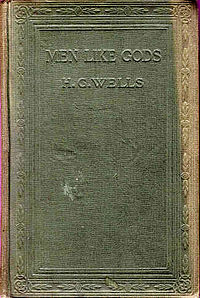- Men Like Gods
-
Men Like Gods 
First Edition CoverAuthor(s) H. G. Wells Country United Kingdom Language English Genre(s) Fiction Publisher Cassell and Company, Ltd[1] Publication date 1923 Media type Print (Hardback) ISBN NA Preceded by The Secret Places of the Heart Followed by The Dream Men Like Gods is a novel written in 1923 by H. G. Wells.[1][2] It features a utopian parallel universe.
Contents
Plot summary
The hero of the novel, Mr. Barnstaple, is a depressive journalist working for a newspaper called the Liberal. At the beginning of the story, Barnstaple, as well as a few other Englishmen, are accidentally transported to the parallel world of Utopia. Utopia is like an advanced Earth, although it had been quite similar to Earth in the past in a period known to Utopians as the "Days of Confusion." Utopia is a utopian world: it has a utopian world government, advanced science, and even pathogens have been eliminated and predators are almost tamed. Barnstaple is confounded and confused by the utopian attitudes: "Where is your government?" he asks. "Our government is in our education" is the answer. Barnstaple gradually loses his Victorian English narcissism. For instance, Wells makes comments on personal responsibility when Barnstaple sees a person slaving over a rose garden at high altitude and asks, "Why don't you hire a gardener?" The answer is, "The working class has vanished from utopia years ago! He who loves the rose must then serve that rose." Barnstaple is changed by those experiences and he loses his previous view of the world and becomes more sympathetic to the ethos around him. As this conversion starts to take place, Utopians begin to fall ill.
This, however, means that the newly arrived Earthlings pose a grave threat to Utopians, as the latters' immune systems have become weak; the Earthlings have to be quarantined until a solution is found. They resent this isolation and some of them plot to take over Utopia; they are actively opposed by Barnstaple, who has to escape from the quarantine castle to do it, just as superior Utopian technology destroys the Earthling revolt. Finally the Utopians find a way to send Barnstaple back, and the story ends as he goes back to Earth.
Critical response
Contemporaries gave the novel mixed reviews:[3] some considered it to be a weakly plotted story in which Wells's utopian enthusiasm overtook his skills as a writer of scientific romances (his own term for what is nowadays commonly called science fiction). The novel was yet another vehicle for Wells to propagate the so-called "Wellsian utopia", his ideas of a possible better future society, which he has described in several other works, notably in his A Modern Utopia (1905). In literary history, the novel's notable role was to provoke Aldous Huxley into writing Brave New World (1932), his parody and criticism of Wellsian utopian ideas.
Wells himself later commented on the novel: "It did not horrify or frighten, was not much of a success, and by that time I had tired of talking in playful parables to a world engaged in destroying itself."[4]
Several characters in the novel are directly taken from the politics of the 1920s, the character Rupert Catskill in the novel probably represents Winston Churchill,[5] as he was seen at that time, as a reckless adventurer. Catskill is depicted as a reactionary ideologue,[6] criticises Utopia for its apparent decadence, and leads the attempted revolt against Utopia.
Notes
- ^ a b "Publication Listing / Men Like Gods". The Internet Speculative Fiction Database. http://www.isfdb.org/cgi-bin/pl.cgi?MNLKGDSFCP1923. Retrieved 2010-02-12. "First published 1923"
- ^ "Men Like Gods by H G Wells". FantasticFiction. http://www.fantasticfiction.co.uk/w/h-g-wells/men-like-gods.htm. Retrieved 2010-02-12. "January 1923"
- ^ H. W. Wilson Company, ed (2007). The Book Review Digest. 20. BiblioBazaar, LLC,. ISBN 9781116071306. "fails to work his material into a homogeneous product ... - + Boston transcript p2 My 26 '23 ... hardly likely to rank as ... greatest ... but it is difficult ... to find an effective argument against ranking it as the most beautiful ... + - Greensboro (N C) Daily News p19 Jl 29 '23 ... amusing ... so breathless an adventure ... revealing eloquence ... H. W. Boynton + Ind 110 379 Je 9 '23 ... clever bits ... amusing touches ... entertaining ... L M Field + Int Bk R p54 Je '23 ... not only inferior and commonplace, but a plagiarism of Wells's own earlier books ... obsessed by opinions ... M M Colum - Lit R p809 Jl 7 '23 ... right in his premises + Nature ... deftness and sense of the comic ... may taste like ashes and sawdust ... + - New Repub ... laziness ... - N Y Tribune ... richness of humor, of satire of description ... + N Y World ... not a rhapsody ... one of most delightful novels ... brilliant and inspired ... + - Spec"
- ^ Franson, Robert Wilfred (February 2003). "Men Like Gods - H. G. Wells". Franson Publications. http://www.troynovant.com/Franson/Wells/Men-Like-Gods.html. Retrieved 2010-02-12. "1934 preface to Seven Famous Novels by H.G. Wells, the author says:"
- ^ "Churchill & the Literary World". The Churchill Centre and Museum at the Cabinet War Rooms. London. http://www.winstonchurchill.org/learn/reference/churchill-trivia/538-literary. Retrieved 12 February 2010.
- ^ Weidhorn, Manfred (1992). A harmony of interests: explorations in the mind of Sir Winston Churchill. Fairleigh Dickinson Univ Press. pp. 43. ISBN 9780838634660.
External links
Categories:- 1923 novels
- Novels by H. G. Wells
- British science fiction novels
- 1920s science fiction novels
- Utopian novels
Wikimedia Foundation. 2010.
